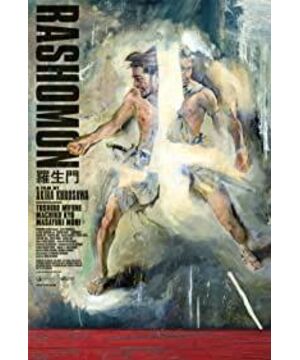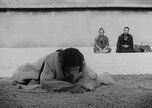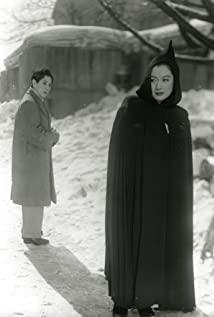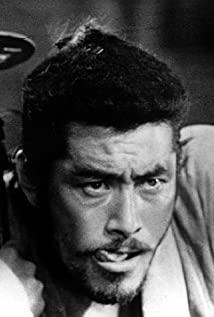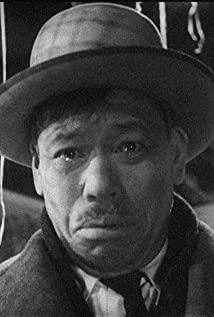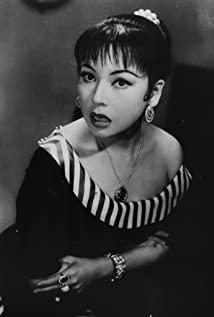About the murder weapon and the murderer
movie about a total of six people were deployed, three murder party (bandit, the woman, warrior), Rashomon three people (farmers, monks, passer). I wanted to discuss the plot from the beginning, but found that this would make the whole logic very confusing, because as far as the whole film is concerned, the narrative of the first three people makes it impossible for us to determine the truth or falsehood. Maybe we can know the beginning of the whole incident from the mouth of the robber at the beginning. Part of the truth, but then the words of the woman and the samurai will bring the murderer, the weapon back into the mystery. There is a detail in the last part of the samurai's testimony, at the end of what the witch said: "Then someone came up to me quietly, and the man gently pulled the dagger from my chest...". Simultaneously the monk and the farmer are sitting behind the witch, and the farmer's unnoticed nuance when the witch utters that passage leads us to the final answer - the dagger, not the sword, is the murder weapon. And it was the farmer who drew the dagger and stole it, so much so that he hastily refuted the existence of the dagger and hurried to give his testimony. (I thought that this detail would lead to the real murderer, but looking back now, I am afraid that this detail was just to bring out the fact that the farmer stole the dagger) But who is the murderer, there is no clue. Maybe many people will think it is a robber, because the farmer has no stake in the final testimony, so the part except the dagger should be true, but we can't think it is true because no one told us the truth .
About four people lie
Obviously, we know that four people inevitably someone is lying, but we can not determine who lie, we can do is look back to see everyone's testimony.
Among all the testimony of the robber, his part is the longest, because the whole thing is based on his testimony to set an overall framework for the story. In the later testimony, we can see that no one raised doubts in the first half. Disagreement arose after people were insulted. In his testimony he justly admitted the crime he committed, he insulted the woman and killed him in the final duel with the samurai, he had a better swordsmanship than the samurai, but how was he killed by the samurai What about the one who was arrested? The officer said that he fell off his horse, but he refuted it. In his testimony, the notorious him described himself as more like a hero who dared to act. Why? He dared to say this, as he himself said: "I know you will kill me sooner or later, so I am not going to hide anything." He can only give himself a gray life in his final testimony. Leave some self-respect.
The woman in her testimony, she kept silent about the fact that he was insulted (from the film we can even think she did it voluntarily), the robber abandoned her after insulting her, and did not forget to take her husband The sword, but her husband did not give her a chance to change. She begged for his forgiveness, but received indifference. As a result, she killed her husband by mistake. In the end, she tried to throw herself into the river but failed repeatedly. In her testimony, she seemed to be the image of a pitiful, helpless and virtuous woman.
The samurai robber became a righteous man again. Although he insulted his wife, he still wanted to take responsibility for her. However, the vicious woman ordered the robber to kill him. The robber also began to hate the woman and let him go. Also forgive the robber. However, he couldn't face himself. For him as a samurai, it was a great shame for his wife to be insulted and unable to protect him and tied to a tree by a robber. In this case, he chose to commit suicide to save his samurai. The dignity of the man, yet he doesn't say a word about being caught by robbers because of his greed for money.
The farmer apparently did not have the dagger at all in his testimony. He strongly demeaned the 3 parties. In his testimony, the robber and the warrior were both weak and incompetent people. The two were provoked by the vicious woman in a ridiculous duel. The robber luckily defeated the warrior, and the woman The man fled from the sight of the stupid robber again, and although he did not appear in his testimony, he raised his image by trying to demean the other three.
When we still want to explore who is the murderer, the lies of the 4 people are confusing. The first thing is that the testimony is contradictory, which makes it impossible to see the truth of the incident. At the same time, why did they lie, and they even lied so much? Admitting that we have killed people forces us to think. And if we think about it from this point of view, we will eventually find that it doesn't really matter who the murderer is.
On the Causes and Human Nature of Lying
As far as the first three people lied, they all said they were murderers, but we have to see what situation they are in and how dare they lie like this. The robber was already notorious, and he knew that he would die, so he heroized his robbery behavior to gain his spiritual comfort. The woman was insulted by robbers, and her husband was dead, which made him lose confidence in his bleak life, and finally had to lie to win the sympathy of others. The samurai wanted to make people forget their incompetence and greed for money, and did not hesitate to elevate the robber to show their bearing as a samurai, and to die with dignity. Why did the farmer lie? He just wanted to devalue the other 3 people and let others know that the 3 people were not what they said in their own testimony, so that people would forget about the dagger. Personally, I think the most thought-provoking words in the whole film come from two outsiders, a passerby who came to Rashomon to take shelter from the rain, and the monk. The passerby represents realism, and the pursuit of advantages and avoidance of disadvantages and people's livelihood are concentrated in him, but his words all reveal the truth: "It is human nature to lie, and most of the time we even You can't be honest with yourself." And the monk's preaching exposes the reason for lying: "That's because people are too vulnerable to lie. Even to themselves." Regarding lies, this is going to be a complicated issue, but I think we can at least simply divide lies into two categories, malicious and non-malicious, obviously malicious lies are definitely something we all despise, as that What the passer-by does (eventually he disappears in the rain, the moral is self-explanatory), is not going to be the scope of our discussion. If we think about the lies of these four people, we can find that they are by no means malicious. The robber, the woman, and the samurai all had tragic endings. They lied just to make themselves feel better, and to gain the sympathy or respect of others. As for the farmer, we can know from the end that his life is difficult. Stealing the dagger can also be said to be a last resort. We cannot imagine that a rich man will go to get the dagger, which obviously cannot be established logically, because it will It's malicious, and that's out of the gist of the film. To a certain extent, these 4 people are aware of their own evil (this cannot be simply understood as evil in the usual sense, but the defects of human nature itself, which are common to almost everyone), and they want to change The willingness to be good, of course, the process of transformation is not easy, they can't face their own evil, so they hope that there is a simple way to make others get the impression of goodness, and that is lying, which is obviously based on this reason. is universal, we can't simply judge this kind of behavior as good or bad, like our attitude to the impression that every liar got when we first watched this film, maybe we always thought that what everyone said was a fabrication, But on second thought it doesn't matter if we believe what everyone says is true, because that doesn't change the outcome of the story, and yet we get a better world.
So we go from here
people is the case, face their own shortcomings, it is so helpless. It is so difficult to change those flaws that we cannot face them head on. After the passer-by snatched the abandoned baby's belongings, the farmer said: "Everyone is selfish and dishonest, and loves to make excuses." What should we do about this, from the end of the film, we learn from Kurosawa Akira got his answer. The monk has always been a symbol of goodness, and he is willing to believe everyone from beginning to end, but because of this, 3 completely contradictory testimonies make it painful, and even the farmer's lies are exposed by passers-by. When the farmer saw the real evil of the passers-by, he reflected on himself and decided not to lie, but to change his evil by adopting an abandoned baby, which finally made the two of them redeemed and the monk as well. For the real answer, trust those 3 people like you trust the farmer, and that will save him from the misery. Yes, if you have good intentions, try to change with practical actions and try to lie as little as possible, and try to trust others, so that at least the world will be better in the end.
View more about Rashomon reviews


